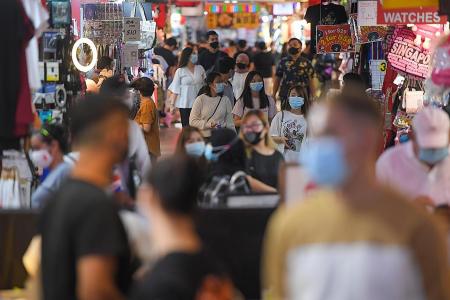Still critical for Singaporeans to be vigilant against virus: Experts
Expert says Singaporeans must continue to keep up with safe distancing measures, or whole community can be at risk
A recent family cluster of five Covid-19 cases from two households is a sign that it is still critical for Singaporeans to continue safe practices, at least until there is a viable vaccine, experts cautioned yesterday.
The Health Ministry said on Sunday it is investigating if there were any breaches in safe distancing rules that led to the family cluster.
Increasingly, Singaporeans have been letting their guard down, and gatherings - such as a birthday celebration of 20 people across four tables in a restaurant - are not an uncommon sight.
But the grim reality is that things can get better slowly and can also get worse very quickly, Professor Dale Fisher, a senior infectious diseases expert at the National University Hospital told The Straits Times.
"The public needs to have a long-haul view and if individuals or groups decide to have their own set of rules, they stand to put the whole community at risk."
Professor Teo Yik Ying, dean of the National University of Singapore's Saw Swee Hock School of Public Health, said: "Until we are confident that Singapore will no longer see chains of community infections, individuals, employers and businesses must continue to keep up with the safe management measures."
He said the recent cluster was particularly worrying, as at least one of the confirmed cases was still active in the community while symptomatic.
An uptick of community cases locally could also see other countries making it harder for Singaporeans to travel, Prof Fisher noted.
There are signs that it may not be all smooth sailing ahead if people are not vigilant, he said, pointing to the sight of crowded malls. "It's important to not build crowds as that setting could see a superspreading event," he said.
"There are so many people and safe distancing is not possible. Of course, our numbers remain good but what makes increasing numbers is the bad behaviour such as crowding and the lack of safe distancing."
The relaxation of rules also depends on factors beyond the sheer number of people in a group, said Associate Professor Alex Cook, vice-dean of research at the NUS Saw Swee Hock School of Public Health.
Things like the size of a space, the proximity of people in it, the level of ventilation, and if there will be eating, loud conversation or singing, all play a role in determining the level of risk, he noted.
Nonetheless, despite the persistence of community cases, Singapore remains in a good position, he said. "The two most important things are that we avoid exceeding our Intensive Care Unit capacity, and that our contact tracing teams can handle the number of cases. At the current level of transmission, neither is an immediate threat."
With Covid-19 a new normal that everyone needs to adapt to, being able to deal with some level of fatigue would be critical, the experts noted.
Get The New Paper on your phone with the free TNP app. Download from the Apple App Store or Google Play Store now



